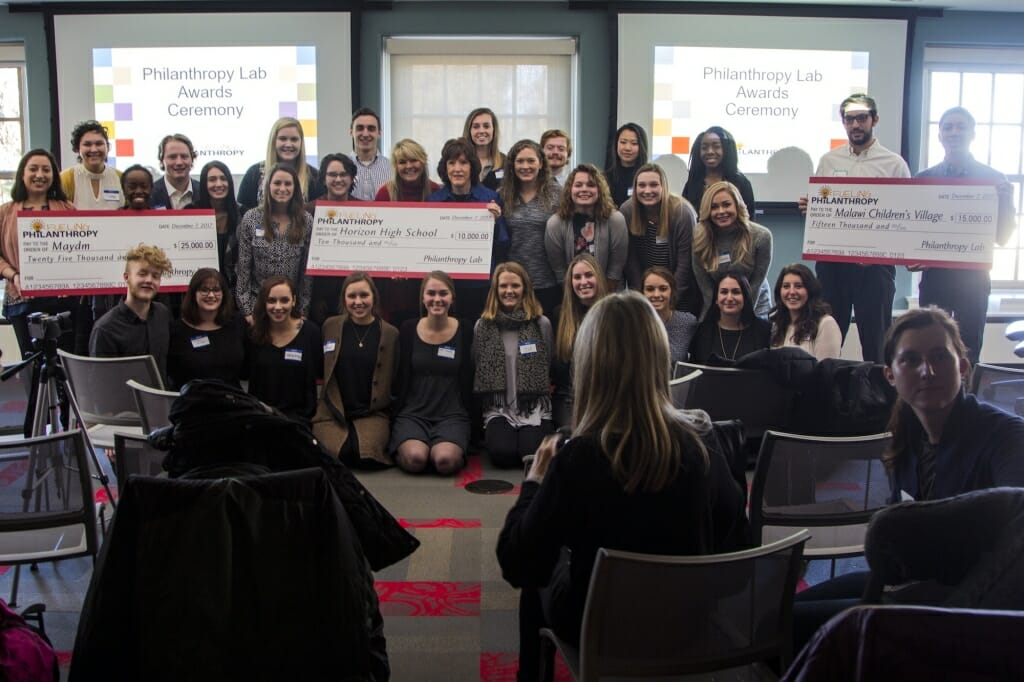In second year, UW’s Philanthropy Lab class awards $50,000 to three nonprofit groups

Student’s in the School of Human Ecology’s Philanthropy Lab class award checks to three charities. After consideration in the class, the students awarded $10,000 to Horizon High School, $15,000 to Malawi Children’s Village, and $25,000 to Maydm. Photo by Alan Talaga
At Horizon High School in Madison, fundraising is always a challenge, says director Traci Goll.
The school serves students recovering from drug and alcohol abuse, a constituency that doesn’t tend to elicit the same kind of immediate sympathy as those helped by many other nonprofits, Goll says. Yet the work is vital.
“We’re changing lives and empowering kids,” she says. “We want them to be healthy, happy and sober again.”
Horizon High School was one of three Madison-area nonprofit organizations chosen to receive money this semester from the University of Wisconsin–Madison’s Philanthropy Lab class.
Based at the School of Human Ecology, the three-credit class offers an innovative learning opportunity in philanthropic giving. At the end of the semester, students distribute $50,000 to nonprofit groups of their choice following a rigorous assessment and evaluation process they develop. This year, the students awarded $10,000 to Horizon High School, $15,000 to Malawi Children’s Village, and $25,000 to Maydm.
Malawi Children’s Village works to enhance the lives of orphans in the African country. Maydm is geared towards introducing girls and youth of color to technology and programming.
The UW–Madison class was created in partnership with the Morgridge Center for Public Service on campus and is sponsored by The Philanthropy Lab, a national foundation that has given more than $6.8 million to build philanthropy education at 22 universities across the United States.
The Philanthropy Lab provides the entirety of the money that is awarded by the UW–Madison class.
“The course explores philanthropy and civic engagement through giving time, money and effort to a public purpose,” says professor Cynthia Jasper, the lead instructor. “Students decide on the distribution of $50,000 to support philanthropic goals that reflect their values. They learn about the philanthropic process, including creating a giving plan as well as exploring strategic and creative ways to give that promote civil society and engagement.”
In two years, students will evaluate the success of the three projects funded this year, Jasper says.
At Horizon High School, the $10,000 award will cover one year of expenses for the school’s life skills program, which takes students into the community every Tuesday for an educational or recreational field trip, Goll says. The school currently has 15 students.
“The course explores philanthropy and civic engagement through giving time, money and effort to a public purpose.”
Cynthia Jasper
The UW–Madison students undertook their work with great diligence, Goll says.
“I was impressed that they actually visited our school to truly learn about our story,” she says. “They asked really good questions. They wanted to know what made us different from other alternative schools.”
The $25,000 awarded to Maydm will launch an initiative aimed at working in great depth with 16 high school girls over six months, teaching them life skills as well as technology skills, says Valeria Martinez, the organization’s operations coordinator. Each participant will work on a project that will benefit the community using their newly acquired tech skills.
The project funded at Malawi Children’s Village focuses on helping young girls of secondary school age have access to affordable or free feminine hygiene products, says board member Don Gray. That should decrease the difficulty many young girls have in attending school regularly without extreme embarrassment, he says.
This year, 31 local nonprofit groups applied for grants. The 25 college students in the class worked with the groups to identify their biggest needs, with the goal of strengthening the community.
Two ambassadors of the class will attend a nationwide Philanthropy Lab conference next summer, where they will promote one of the deserving local nonprofits for a chance to receive additional funds.
This was the second year the class has been offered at UW–Madison. Last year, the $50,000 was divided among five local organizations, each receiving $10,000: Gio’s Garden, Neighborhood House Community Center, Theatre LILA, Forward Learning Youth & Young Adults and OutReach Community Center.
The class will be offered next in the fall of 2018.



